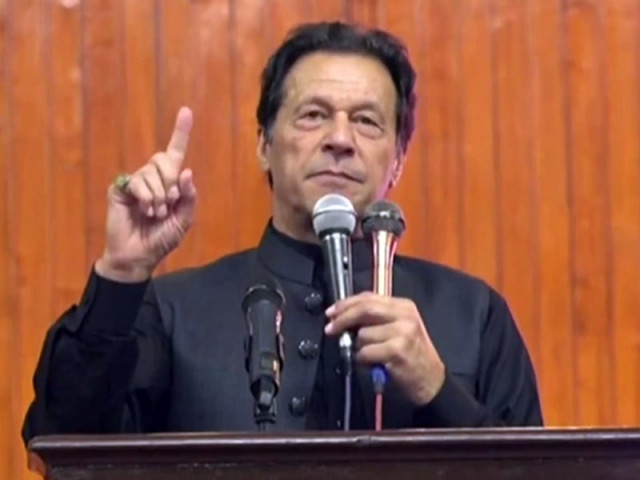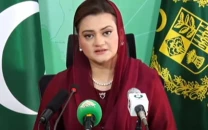Imran evades contempt conviction for 2nd time
Using similar statement, he had also convinced SC to let him off the hook nine years ago

Once again PTI chairman and deposed premier Imran Khan's personal submissions narrowly secured him from indictment in a contempt case for threatening Additional District and Sessions Judge Zeba Chaudhry.
When former chief justice of Pakistan Iftikhar Muhammad Chaudhry had initiated contempt proceeding against Imran for scandalising the judiciary's role in the 2013 general elections, Hamid Khan was representing him just like in the female judge’s case.
عمران خان ہائیکورٹ میں داخل pic.twitter.com/0mkAHnIHGA
— PTI (@PTIofficial) September 22, 2022
However, Hamid was unable to convince the bench to drop the contempt proceedings.
Finally, the PTI chief on August 28, 2013 came to the rostrum and gave a similar statement, which he had uttered before the IHC larger bench on Thursday.
Nine years ago, Imran had assured the court that he was committed to the supremacy of the judiciary as an independent and highly respected institution. Therefore, he added, in the future there would be no such occasion when the court would find him attributing any derogatory or scandalous remarks against this institution.
Read Imran Khan's political fortunes hinge on top court
He said he understood well that in every democratic country, it was extremely necessary that the judiciary as an institution should be allowed to function independently, in a most respectable and smooth manner without being made controversial so that the public at large may have full confidence in this institution.
He added that he himself had full faith and confidence in this institution, particularly, in the present-day judiciary, which had demonstrated its courage and independence in a number of important cases decided in the recent past.
The SC had noted that the conduct of the PTI chief in court and observed that throughout the proceedings it was evident from his body language that he held full respect and regard for it.
“Even, while addressing the court, he [Imran] had shown signs of encountering an unpleasant situation and remorse on his face with reference to these proceedings, which have expanded from his one word objectionable remark,” read the apex court’s nine-year-old order.
When the IHC allowed him to give his submission on Thursday, Imran was visibly puzzled and he gave an accurate statement, which was advised by his legal team.
It was witnessed that before the start of the hearing, Imran’s counsel Salman Safdar was consistently preparing him for giving this statement in the courtroom.
It has been learnt that Safdar was accompanying Imran in the vehicle during his travel from his residence to the IHC.
Read more SC backs IHC advice, urges PTI to return to parliament
Safdar was convincing the ex-premier to give the statement and there was no need to contest or give an explanation.
IHC Chief Justice Athar Minallah also appreciated Imran's statement thrice. In his statement, the PTI chief offered tendering an apology to the female judge thrice during the brief hearing.
After the hearing, Imran's attorney Hamid was very jubilant and he especially thanked both amici curiae Makhdoom Ali Khan and Muneer A Malik, who came from Karachi to attend the hearing.
The IHC proceedings were also significant for Hamid, who faced a tough time from a rival section within the party.
The same section within the PTI was consistently suggesting Imran to replace Hamid with a new lawyer.
PTI leader Fawad Chaudhry even criticised Hamid's performance on TV.
Sources told The Express Tribune that Imran was also willing to tender an unconditional apology.
However, the legal team told him that an unconditional apology would be tantamount to acceptance of guilt. Therefore, he was asked to offer a conditional apology.
Interestingly, one member of the team was in favour of raising legal objections to the IHC proceedings but others rejected his idea.
A senior lawyer believes that contempt law was very complicated and its jurisprudence was also inconsistent.
After the restoration of judges in March 2009, the superior courts initiated several contempt cases against political leaders.
During ex-CJP Iftikhar's era, contempt proceeding was initiated against superior court judges, who had violated the November 3, 2007 order and took oath under the Provisional Constitutional Order (PCO).
The SC dropped contempt proceedings against the PCO judges after they tendered an unconditional apology.
A lawyer considers that that was the worst kind of contempt by the PCO judges and validated abrogation of the Constitution by former military ruler Gen Pervez Musharraf.
Later, former CJP Iftikhar had issued contempt notices to several PPP leaders on the charge of scandalising judges.
The court used these contempt proceedings as an act of 'deterrence' and did not convict anyone.
However, a seven-judge larger bench had convicted then premier Yousuf Raza Gilani for not implementing its December 16, 2009 judgment on the National Reconciliation Ordinance (NRO).
During ex-CJP Saqib Nisar’s tenure, three PML-N lawmakers — Nehal Hashmi, Talal Chaudhry and Danial Aziz — were convicted on the charge of scandalising judges after the Panamagate judgment wherein ex-prime minister Nawaz Sharif was disqualified for life.
Three judges of the apex court led by Justice Asif Saeed Khosa had awarded a one-month sentence to Nehal Hashmi even after he had submitted an unconditional apology to the court.
Lawyers had expressed disappointment over his conviction.
The lawyers are also appreciating the IHC for avoiding following the jurisprudence evolved in contempt cases during ex-CJP Saqib Nisar's era.
They also believe that judges' reputation is also at stake in contempt cases.
The IHC CJ is also sensitive in matters related to civil liberties and contempt matters.
Waqar Rana, a member of another legal team of the PTI chief, said today the dreams of those who wanted Imran disqualified were shattered.
"It is a great day for Pakistan as its most popular leader submits to the majesty of justice and reiterates his commitment for the rule of law,” he added.
{pdf}
Strict security in place
Strict security arrangements were made inside and around the court prior to the hearing, security was increased in various areas of the federal capital to deal with any potential untoward situation. The number of personnel deployed at sensitive places and important routes was increased.
The entry of lawyers, law officers and journalists in the courtroom was subject to entry passes, while the registrar of the high court also provided the facility to listen to audio cases in the press room and bar room.
A 15-member legal team of Imran, 15 law officers from the attorney general and advocate general office, three court assistants and 15 court reporters were allowed to be present in the courtroom.
The circular stated that five lawyers each from the high court and district bar will be allowed in the courtroom.



















COMMENTS
Comments are moderated and generally will be posted if they are on-topic and not abusive.
For more information, please see our Comments FAQ